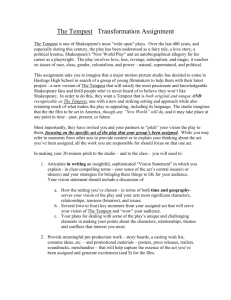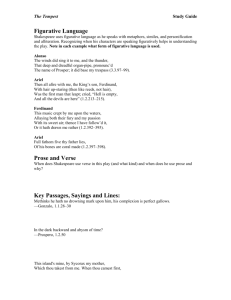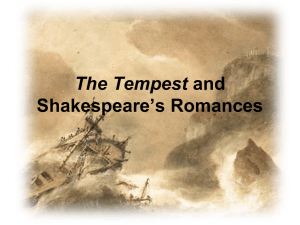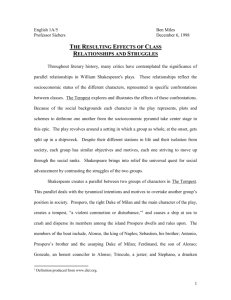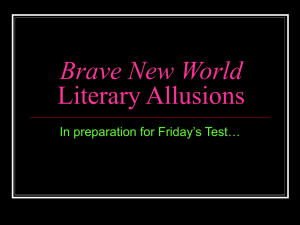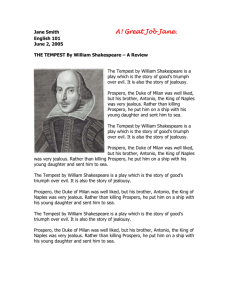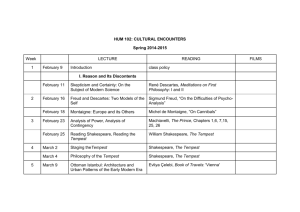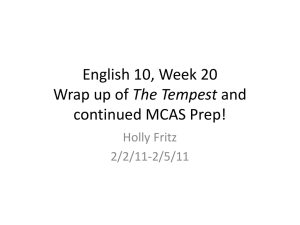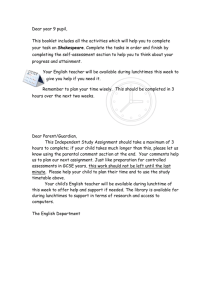The Tempest The Magic of Shakespeare
advertisement
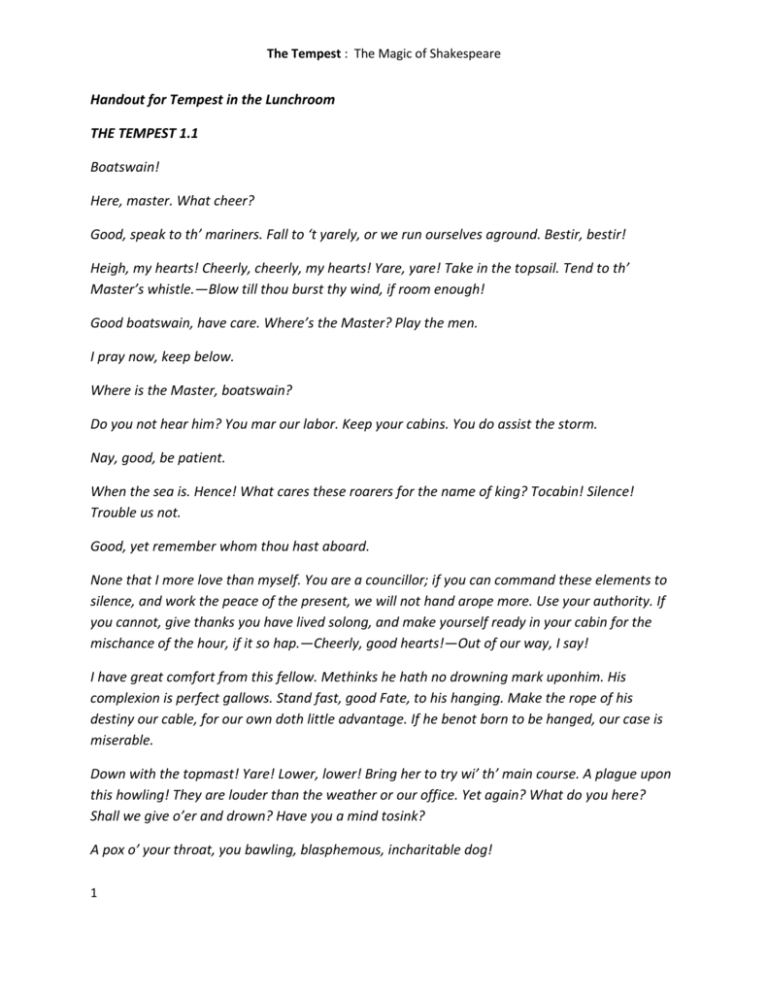
The Tempest : The Magic of Shakespeare Handout for Tempest in the Lunchroom THE TEMPEST 1.1 Boatswain! Here, master. What cheer? Good, speak to th’ mariners. Fall to ‘t yarely, or we run ourselves aground. Bestir, bestir! Heigh, my hearts! Cheerly, cheerly, my hearts! Yare, yare! Take in the topsail. Tend to th’ Master’s whistle.—Blow till thou burst thy wind, if room enough! Good boatswain, have care. Where’s the Master? Play the men. I pray now, keep below. Where is the Master, boatswain? Do you not hear him? You mar our labor. Keep your cabins. You do assist the storm. Nay, good, be patient. When the sea is. Hence! What cares these roarers for the name of king? Tocabin! Silence! Trouble us not. Good, yet remember whom thou hast aboard. None that I more love than myself. You are a councillor; if you can command these elements to silence, and work the peace of the present, we will not hand arope more. Use your authority. If you cannot, give thanks you have lived solong, and make yourself ready in your cabin for the mischance of the hour, if it so hap.—Cheerly, good hearts!—Out of our way, I say! I have great comfort from this fellow. Methinks he hath no drowning mark uponhim. His complexion is perfect gallows. Stand fast, good Fate, to his hanging. Make the rope of his destiny our cable, for our own doth little advantage. If he benot born to be hanged, our case is miserable. Down with the topmast! Yare! Lower, lower! Bring her to try wi’ th’ main course. A plague upon this howling! They are louder than the weather or our office. Yet again? What do you here? Shall we give o’er and drown? Have you a mind tosink? A pox o’ your throat, you bawling, blasphemous, incharitable dog! 1 The Tempest : The Magic of Shakespeare Work you, then. Hang, cur, hang, you whoreson, insolent noisemaker! We are less afraid to be drowned than thou art. I’ll warrant him for drowning, though the ship were no stronger than a nutshell and as leaky as an unstanched wench. Lay her ahold, ahold! Set her two courses. Off to sea again! Lay her off! All lost! To prayers, to prayers! All lost! What, must our mouths be cold? The King and Prince at prayers. Let’s assist them, for our case is as theirs. I am out of patience. We are merely cheated of our lives by drunkards. This wide-choppedrascal—would thou mightst lie drowning the washing of ten tides! He’ll be hanged yet, though every drop of water swear against it and gape at wid’st to glut him. “Mercy on us!”—“We split, we split!”—“Farewell, my wife and children!”—“Farewell, brother!”—“We split, we split, we split!” Let’s all sink wi’ th’ King. Let’s take leave of him. Now would I give a thousand furlongs of sea for an acre of barren ground: long heath, brown furze, anything. The wills above be done, but I would fain die a dry death. copyright 2002 Folger Shakespeare Library The following guide is provided by Joseph R. Scotese through the Folger Shakespeare Lesson Plan Series. Today students will be introduced to The Tempest. They will act out the opening shipwreck scene, or watch and direct others doing it. By doing this activity, students will use the text to understand the plot, see that what seemed daunting is not quite so difficult, and have fun and embarrass themselves in the name of Shakespeare. This activity will take one class period. What to Do: 1. Preparation (reading the night before) Students will have read the opening shipwreck scene before coming in to class today. 2 The Tempest : The Magic of Shakespeare Expect (didn't they teach you never to have any "prejudgments" about students?) students to grumble that they didn't "get it." 2. Getting started Before you can say "lack Robinson" rush the students out to some public place that has lots of movable objects like desks and chairs. Lunchrooms and study halls are ideal. Break the students up into groups of seven to ten. 3. Students on their feet and rehearsing the scene Give the students scripts of the scene from which you've removed any stage directions, line numbers or glosses. Have the students divide the parts for the opening scene. Make sure they include all the sailors, crashing waves, etc. Then they are first to pantomime the entire scene, so they must plan and act out every important action that occurs in the scene. Give the groups a good ten minutes to do this. 4. The finished product Have all the groups present their pantomimes. After each scene ask students (the ones not performing) to quietly write down what the performing group did well and what they might have missed. When all of the scenes have been performed, have the students read their comments. 5. Directing the spoken scene Randomly choose one of the groups and have the students perform the scene complete with words. Give them five minutes or so to prepare and tell them to make sure they include the students suggestions for all of the scenes. If time permits, allow the other students to make comments that direct the group's performance. What you'll need: a lunchroom; kids who aren't afraid of getting a wee bit embarrassed; a copy of the shipwreck scene that has had all of the stage directions, line numbers, and glosses taken out How did it go?: You can check how the students did based on their pantomimes, their comments, their final production, and the inclusion of any comments such as "that wasn't as hard as it seemed last night ..." More specifically, after you are finished, ask the students to contrast their understanding of the scene before and after the exercise. (You may wish to have them write down their understanding of the scene before you begin, then have them write it again after they finish.) 3 The Tempest : The Magic of Shakespeare Activities Carol Jago'S Four Boxes I've adapted her technique listed in the book, so that Elementary and Middle school students working on Shakespeare can use it as well. 1. Begin with a large sheet of white paper and have the class fold it into fours. 2. Based on in-class reading or discussion of a theme or plot within the play (revenge, Prospero frees Ariel, Proteus lies to the Duke, friendship, etc.), have the students, in the FIRST BOX, draw a picture of a powerful image they had during the reading or discussion. You may assign the entire class one theme or plot or you could have the students choose the image that spoke strongest to them. This image mayor may not directly relate to the example within the play- the student may chose to represent something from their life or the play, whichever is stronger. Not everyone's an artist- and artistic talent is not required- just a sincere effort to get at what's in their mind's eye. Encourage them to draw a metaphor of those thoughts, feelings, or themes. 3. In the SECOND BOX, put that picture into words. Ariel is a cloud that wears cinderblock boots. She flies around and stuff, but she's still stuck in the mud and can't blow away like the other clouds. 4. In the THIRD BOX, have the students pretend that they are the teacher. Have them write down what or how they would teach the theme or plot discussed. 5. In the FOURTH BOX, have them write a poem, create a word collage, write a quote from the play, a piece of a song, or in any other way that suited them to respond to the scene or theme drawn. It can take a single class period or be stretched out over two or three. It provides the option of allowing students to explore themes or scenes that they found powerful in the play and they examine this moment from various perspectives. Scatterbrained Soliloquies Can be used with 4th – 12th graders depending on the passage. The following is provided by Russ Bartlett through the Folger Shakespeare Lesson Plan Series. Small groups of students will look at a famous soliloquy or monologue whose lines have been written on sepa-rate pieces of paper and then scrambled. As the students work to reassemble their scrambled passages, they will become more aware of sentence structure, meter, meaning, characterization, and vocabulary. You will need one scrambled soliloquy or monologue packet for each small group; each packet must be printed on different colored paper. This lesson will take one to two class periods. 4 The Tempest : The Magic of Shakespeare 1. Divide the class into small groups of three to five students, and assign each group a color. Explain that they will be looking at a passage from the current play, trying to make sense of its meaning. First (my favorite part)... 2. Take all of your scrambled packets, mix them together for a rainbow effect, and throw them up into the air, in two or three dramatic tosses. Once the pieces of paper settle to the floor ... Activities 3. Assure the students that you have not gone crazy. Remind each group of its assigned color, and ask each group to pick up all the pieces of that particular color. Each group should end up with the same number of pieces. Briefly set up the context of the speech and explain that now they must... 4. Put the speech in order, laying out the papers on their desktops or on the floor. (No peeking in their books is allowed!) How can they accomplish this task, they wonder, not knowing many of the words or expressions? Easy, you tell them... 5. Create a word bank on the blackboard, noting unfamiliar words, phrases, and concepts. Ask a few probing questions that might help them figure out the meanings for themselves. If students get stuck on a particular word or phrase, have the students refer to dictionaries or Shakespearean glossaries. Armed with this new knowledge, they can... 6. Put the various pieces of paper in order and be prepared to explain/defend all of the choices made. Why did you put a certain line where you did? What clues led to your group's final order? When the groups are |finished... . 7. Pick one group to read its assembled passage aloud, while other groups check it against their finished |sequences. After one group has had its chance... 8. Check the order of the lines in each group's soliloquy, asking each group to explain its choices. List on the board the criteria used to determine line order. Compare and contrast the different versions. When the entire class has decided on the best, most accurate, plausible or even elegant version ... 9. Tack the pieces in order on a bulletin board, or punch holes in them and string them together for a hanging display. The possibilities are endless. Inform the students that they may now… 10. Consult their texts to check the order of the speech. Were the students able to reassemble the soliloquy in logical and meaningful ways? Did the explanations offered by group members reflect attentiveness to meaning, sound and rhyme, characterization, compatibility with prior events occurring in the play, etc.? "Scatterbrained Soliloquy" packets: You will need to divide up the speech into at least ten sections, writing in large letters on white typing paper. Preserve the poetry in your transcribing (don't turn it into 5 The Tempest : The Magic of Shakespeare prose as you copy it) but feel free to create a break in mid-line or mid-sentence. When you have broken up the passage into at least ten sections, copy the sets in different colors or number them per group, as many different colors or |numbers as there are groups participating. The prep time for this lesson is a bit long, but if you collect the copies from your students at the end of the exercise, you can use the packets again next year. Our revels now are ended. These our actors, As I foretold you, were all spirits and Are melted into air, into thin air: And, like the baseless fabric of this vision, The cloud-capp'd towers, the gorgeous palaces, The solemn temples, the great globe itself, Yea, all which it inherit, shall dissolve And, like this insubstantial pageant faded, Leave not a rack behind. We are such stuff As dreams are made on, and our little life Is rounded with a sleep. William Shakespeare From The Tempest, Act 4 Scene 1 Ye elves of hills, brooks, standing lakes and groves, And ye that on the sands with printless foot Do chase the ebbing Neptune and do fly him When he comes back; you demi-puppets that By moonshine do the green sour ringlets make, Whereof the ewe not bites, and you whose pastime Is to make midnight mushrooms, that rejoice To hear the solemn curfew; by whose aid, Weak masters though ye be, I have bedimm'd The noontide sun, call'd forth the mutinous winds, And 'twixt the green sea and the azured vault Set roaring war: to the dread rattling thunder Have I given fire and rifted Jove's stout oak With his own bolt; the strong-based promontory Have I made shake and by the spurs pluck'd up The pine and cedar: graves at my command Have waked their sleepers, oped, and let 'em forth By my so potent art. But this rough magic I here abjure, and, when I have required Some heavenly music, which even now I do, To work mine end upon their senses that 6 The Tempest : The Magic of Shakespeare This airy charm is for, I'll break my staff, Bury it certain fathoms in the earth, And deeper than did ever plummet sound I'll drown my book. William Shakespeare From The Tempest, Act 5, Scene 1 Further Work 1. Analyze Caliban's "the isle is full of noises" speech (1I1.ii.130-138). What makes it such a compelling and beautiful passage? What is its relation to Caliban's other speeches, and to his character in general? What effect does this speech have on our perception of Caliban's character? Why does Shakespeare give these lines to Caliban rather than, say, Ariel or Miranda? CALIBAN Be not afeard. The isle is full of noises, Sounds and sweet airs that give delight and hurt not. Sometimes a thousand twangling instruments Will hum about mine ears, and sometime voices That, if I then had waked after long sleep, Will make me sleep again; and then, in dreaming, The clouds methought would open, and show riches Ready to drop upon me, that when I waked, I cried to dream again. The Tempest 3.2.148-156 2. What is the nature of Prospero and Miranda's relationship? Discuss moments where Miranda seems to be entirely dependent on her father and moments where she seems independent. How does Miranda's character change over the course of the play? 3. Discuss Ferdinand's character. What is the nature of his love for Miranda? Is he a likable character? What is the nature of his relationship to other characters? 4. Who is forgiven at the end of the play and actually accepts the forgiveness? If you were to direct the last scene, how would you stage the forgiveness and who would accept it? Use the text to back-up your ideas. 5. Virtually every character in the play expresses some desire to be lord of the island. Discuss two or three of these characters. How does each envision the island's potential? How does each envision his own rule? Who comes closest to matching your own vision of the ideal rule? 6. Analyze the tempest scene in Act I, scene i. How does Shakespeare use the very limited resources of his bare stage to create a sense of realism? How does the APT Production grapple with the opening? 7 The Tempest : The Magic of Shakespeare Previous productions have had Prospero standing center holding a little wooden boat while the storm sounds and dialogue are heard from off stage. Other productions have had the court and crew enter in a tight boat-like formation while crossing the stage in a rhythmically swaying motion. When the boat splits the court and crew disperse chaotically. If you were to direct the opening tempest scene, how would you approach it? 7. "Have we devils here?" What does Caliban look like? Find all the references to Caliban's look and behavior...‖a man or fish?" Armed with these descriptions design or describe your own costume. Comparison of Shakespeare's Tempest and Forbidden Planet On first glance, Forbidden Planet can easily be seen to parallel many other works relating to technology, nature, or both. One of the most obvious parallels is, of course, to Shakespeare's The Tempest, the story of a man stranded on an island which he has single-handedly brought under his control through the use of magic. Indeed, the characters, plot, and lesson of Forbidden Planet mirror almost exactly those of The Tempest, with the exception that where The Tempest employs magic, Forbidden Planet utilizes technology. At this point, it is useful to recall one of Arthur C. Clarke's more famous ideas, which is that any technology, when sufficiently advanced, is indistinguishable from magic. Indeed, the technology presented in Forbidden Planet is not meant to be understood by the audience, but rather is, for all intents and purposes, magic. This is undoubtedly in part because the technology doesn't exist and therefore cannot be explained to us. What is more important, however, is that how the technology works is irrelevant for the purpose of the movie, which is to entertain and to teach us a lesson about man's control over the elements and over his own technological creations. At this point a brief synopsis of the movie would seem to be in order, with special attention as to how it relates to The Tempest. In The Tempest, a man named Prospero and his daughter Miranda have been exiled to a remote island which is completely uninhabited, save for an evil monster and her son Caliban, and which is in a state of primal chaos. Using the magical powers he has cultivated all his life, Prospero gradually brings the forces of nature on the island under his control, and manages to somehow enslave Caliban, whose mother has died in the interim. A group of sailors is shipwrecked on the island, one of whom falls in love with Miranda, the lovely daughter of Prospero. Eventually, Caliban and other servants plot to overthrow Prospero, but are thwarted and taken back into servitude, thankful to get off that easily. Having summarized The Tempest, it is easy to summarize Forbidden Planet. A man named Dr. Morbius and his daughter Altaira are stranded on a distant planet when a government ship lands there, whose commander falls in love with the beautiful Altaira. The only significant difference in the two works, other then setting, is the conclusion of each. Before we look at the differences there, however, it is necessary to look more closely at the symbolism behind each. In The Tempest, Prospero's magic is a symbol of technology. It lets him tame the island, is completely at his command, and even is understandable by those who take the time to study it. Caliban represents the forces of nature, which 8 The Tempest : The Magic of Shakespeare Prospero has enslaved using magic, a.k.a. technology. It is worth noting here that Shakespeare perceives “nature” in the form of a wild, hostile environment, not as a “garden of eden” form, a concept he pokes fun at in one of the opening scenes. Eventually, nature rises up and lashes out at Prospero, but his magic saves him. He then accepts Caliban back into servitude. The perfect harmony is thus achieved--man using technology to tame nature, and doing it so well that he achieves the best of both worlds. Forbidden Planet teaches a different lesson, and teaches it in two separate stories. The first is the story of the Krell, a superintelligent race that rose to its peak and then fell 2000 centuries before Dr. Morbius and his daughter set foot on the planet. The Krell had achieved what they considered to be the pinnacle of technology--they had left behind their physical bodies in exchange for computers. Their consciousness resided in computers, which “ projected” bodies for them, so to speak. The perfect blending of man (or creature, anyway) and technology. They were, in fact, a version of Hardison's “ silicon creature”--they had no physical bodies, save for a series of ones and zeros stored somewhere in the memory of a supercomputer 40 miles long. What the Krell had forgotten to explore, however, was their own psyche. Confronted with the virtually limitless power they had due to the nature of what they had become, all they did was loot, riot, and otherwise engage in self-destructive activity, so that in one day the entire race was destroyed. In this case, technology in the form of the Krell's supercomputer became a slave to the most basic form of nature--the subconscious, where primal emotions rage with all the fury of a physical tempest. As we see, the results when nature controls technology are disastrous. The second story is the story of Dr. Morbius. At the outset, Altaira IV could easily be mistaken for paradise, albeit an arid and lonely one. While the area that the ship is in is a desert like climate, the dwelling place of Morbius and Alta seems climactic enough. Deer frolick in the nearby forest, and tigers which are normally fearsome killers are petted like kitty cats. It is the tiger which is the first clue that things are going wrong. An obvious symbol of nature, a tiger attacks Alta one day while Commander Adams is there. Adams quickly uses his blaster on the tiger, symbolizing the utter dominance of technology over nature on Altaira IV. Shortly afterwards, things start getting worse, and culminate in a fearsome attack by “nature” in the form of Morbius's subconscious on Adams's ship. As the plot unfolds, we find out that Dr. Morbius, by meddling with technology he didn't fully understand, managed to inadvertently kill dozens of people. It is worth noting that Morbius realizes on some level the extent to which things have gotten out of hand when his daughter pleads with him to help the crew of the ship. His reply to her is along the lines of “I cannot help him (Commander Adams) as long as he stays so willfully”. In short what Morbius is saying is strongly reminiscient of Frankenstein's message, that is, “This technology that I am supposedly ‘master' of has gotten out of my control, and I am powerless to stop it”. Dr. Morbius is a grim reminder again of what can happen when technology is allowed to increase unchecked, to the point where human beings can no longer understand it, let alone control it. Ironically, Dr. Morbius himself warned against the unchecked growth of technology by refusing to allow mankind access to the Krell's wondrous secrets. Instead, he insisted that he would dispense what pearls of wisdom he saw fit, the better to keep mankind from destroying itself. In the end, of course, the entire planet was destroyed, along with several neighboring star systems. 9 The Tempest : The Magic of Shakespeare There are several lessons to be learned from Forbidden Planet. The first is that before man can hope to control nature or technology, he needs to learn to control himself, as evidenced by the disaster which destroyed the Krell. Second, when technology and nature are in direct conflict, the results will not be beneficial, and will probably be destructive. Third, when technology and nature are too far off balance from each other, the results will again be detrimental. In short, Forbidden Planet is a kind of Frankenstein which is more developed and has better symbolism, which is to say that it councils the same course of action that Florman does--caution, but not inaction. If we allow nature to run rampant, we clearly cannot survive. (This statement again takes the assumption that “nature” is a tempest, not a garden of eden.) If we allow technology to go unchecked, it will eventually overwhelm us when we least expect it. And if we pit the two against each other, it will destroy our entire solar system. The proper course of action, then, is just what both Florman and Morbius propose--proceed slowly, and take into account the fact that all that is new is not necessarily good. "Comparison of Shakespeare's Tempest and Forbidden Planet." 123HelpMe.com. 17 Apr 2012 <http://www.123HelpMe.com/view.asp?id=17255>. SCENE I. On a ship at sea: a tempestuous noise of thunder and lightning heard. Enter a Master and a Boatswain Master Boatswain! Boatswain Here, master: what cheer? Master Good, speak to the mariners: fall to't, yarely, or we run ourselves aground: bestir, bestir. Exit Enter Mariners Boatswain Heigh, my hearts! cheerly, cheerly, my hearts! yare, yare! Take in the topsail. Tend to the master's whistle. Blow, till thou burst thy wind, if room enough! Enter ALONSO, SEBASTIAN, ANTONIO, FERDINAND, GONZALO, and others 10 The Tempest : The Magic of Shakespeare ALONSO Good boatswain, have care. Where's the master? Play the men. Boatswain I pray now, keep below. ANTONIO Where is the master, boatswain? Boatswain Do you not hear him? You mar our labour: keep your cabins: you do assist the storm. GONZALO Nay, good, be patient. Boatswain When the sea is. Hence! What cares these roarers for the name of king? To cabin: silence! trouble us not. GONZALO Good, yet remember whom thou hast aboard. Boatswain None that I more love than myself. You are a counsellor; if you can command these elements to silence, and work the peace of the present, we will not hand a rope more; use your authority: if you cannot, give thanks you have lived so long, and make yourself ready in your cabin for the mischance of the hour, if it so hap. Cheerly, good hearts! Out of our way, I say. Exit GONZALO I have great comfort from this fellow: methinks he hath no drowning mark upon him; his complexion is perfect gallows. Stand fast, good Fate, to his hanging: make the rope of his destiny our cable, for our own doth little advantage. If he be not born to be hanged, our case is miserable. Exeunt Re-enter Boatswain Boatswain 11 The Tempest : The Magic of Shakespeare Down with the topmast! yare! lower, lower! Bring her to try with main-course. A cry within A plague upon this howling! they are louder than the weather or our office. Re-enter SEBASTIAN, ANTONIO, and GONZALO Yet again! what do you here? Shall we give o'er and drown? Have you a mind to sink? SEBASTIAN A pox o' your throat, you bawling, blasphemous, incharitable dog! Boatswain Work you then. ANTONIO Hang, cur! hang, you whoreson, insolent noisemaker! We are less afraid to be drowned than thou art. GONZALO I'll warrant him for drowning; though the ship were no stronger than a nutshell and as leaky as an unstanched wench. Boatswain Lay her a-hold, a-hold! set her two courses off to sea again; lay her off. Enter Mariners wet Mariners All lost! to prayers, to prayers! all lost! Boatswain What, must our mouths be cold? GONZALO The king and prince at prayers! let's assist them, For our case is as theirs. SEBASTIAN I'm out of patience. ANTONIO We are merely cheated of our lives by drunkards: This wide-chapp'd rascal--would thou mightst lie drowning The washing of ten tides! 12 The Tempest : The Magic of Shakespeare GONZALO He'll be hang'd yet, Though every drop of water swear against it And gape at widest to glut him. A confused noise within: 'Mercy on us!'-- 'We split, we split!'--'Farewell, my wife and children!'-'Farewell, brother!'--'We split, we split, we split!' ANTONIO Let's all sink with the king. SEBASTIAN Let's take leave of him. Exeunt ANTONIO and SEBASTIAN GONZALO Now would I give a thousand furlongs of sea for an acre of barren ground, long heath, brown furze, any thing. The wills above be done! but I would fain die a dry death. Exeunt 13
